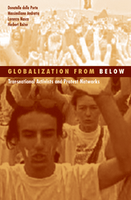Globalization from Below: Transnational Activists and Protest Networks

On November 30, 1999, roughly 50,000 demonstrators descended upon Seattle, Washington, to protest the World Trade Organization (WTO) conference. The mission of the conference was to increase global market liberalization, and every imaginable progressive activist group was in attendance—from Greenpeace and the AFL-CIO to the Sea Turtle Restoration Project, whose members donned turtle costumes and patrolled the crowds to promote non-violence. As the authors of Globalization from Below note, the 1999 WTO protests ignited a global movement that has since surfaced, both in protest and participation, at the 2001 G8 summit in Genoa, Italy, and the 2002 European Social Form in Florence. The authors surveyed activists at the two events in order to analyze the means and motivation of global protest. The results from those surveys, along with other anecdotal and epistolary information, are presented and analyzed in this book. Reader be warned: this is not a Newsweek article or any other easily-digestible political analysis. However, despite the density of the subject matter, the authors, all researchers or professors at the European University Institute, skillfully create a framework around their data to establish the means, medium and message of the global justice movement that calls for "an alternative globalization based on principles different from economic growth and free market . . . and focuses especially on social justice." Chapters like "Global-Net for Global Movements?" and "Media Conscious and Nonviolent?" help ground the data within the particular strategies and repertoires of the movement. The global justice movement has been successful in appealing for debt relief for poor nations and bringing increased environmental standards to the global conversation, if not (alas) to the board room. While analyzing the movement, Globalization from Below offers a cogent critique of neo-liberalism run amok without resorting to conservative isolationism as a cure. There is a way, the activists say, to use globalization to foster human connections and interdependency versus independence and exploitation. "Another world is possible," they chant, and we may want to listen.